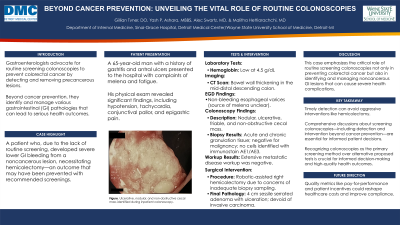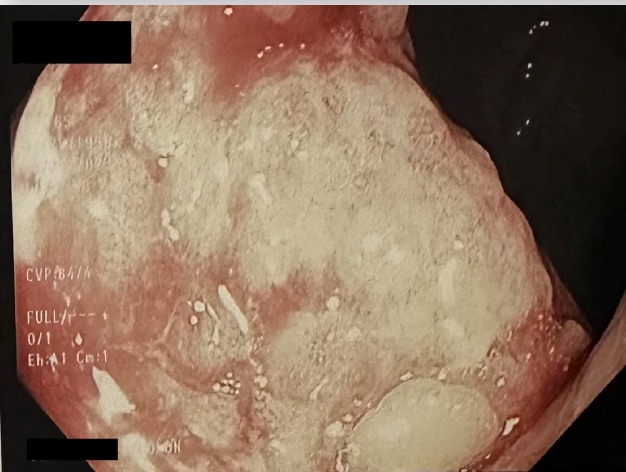Sunday Poster Session
Category: Colorectal Cancer Prevention
P0456 - Beyond Cancer Prevention: Unveiling the Vital Role of Routine Colonoscopies
Sunday, October 27, 2024
3:30 PM - 7:00 PM ET
Location: Exhibit Hall E

Has Audio

Gillian Tyner, DO
Detroit Medical Center/Wayne State University
Detroit, MI
Presenting Author(s)
Gillian Tyner, DO1, Yash P. Ashara, MBBS1, Alec Swartz, MD2, Malitha Hettiarachchi, MD1
1Detroit Medical Center/Wayne State University, Detroit, MI; 2Detroit Medical Center, Detroit, MI
Introduction: Gastroenterologists advocate for routine screening colonoscopies to prevent colorectal cancer by detecting and removing precancerous lesions. Beyond cancer prevention, they identify and manage various gastrointestinal (GI) pathologies that can lead to serious health outcomes. This case highlights a patient who, due to the lack of routine screening, developed severe lower GI bleeding from a noncancerous lesion, ultimately necessitating hemicolectomy, a potential outcome that may have been prevented with recommended screenings.
Case Description/Methods: A 65-year-old man with a history of gastritis and antral ulcers presented to the hospital with complaints of melena and fatigue. On presentation, his physical exam was significant for hypotension, tachycardia, conjunctival pallor, and epigastric pain. Laboratory tests revealed a low hemoglobin of 4.5 g/dL. Abdominal CT showed bowel wall thickening in the mid-distal descending colon. Esophagogastroduodenoscopy (EGD) revealed non-bleeding esophageal varices, but the source of melena remained unclear. Subsequent colonoscopy identified a nodular, ulcerative, friable, and non-obstructive cecal mass. Biopsy, acquired during the colonoscopy, showed acute and chronic granulation tissue, was negative for malignancy, and no cells were identified with immunostain AE1/AE3. Extensive metastatic disease workup was negative. Due to the possibility of inadequate biopsy sampling and risks if left untreated, the patient underwent a robotic assisted right hemicolectomy. The final pathology revealed a 4 cm sessile serrated adenoma with ulceration, devoid of invasive carcinoma.
Discussion: This case emphasizes the critical role of routine screening colonoscopies not only in preventing colorectal cancer but also in identifying and managing noncancerous GI lesions that can cause severe health complications. It highlights the importance of timely detection to avoid aggressive interventions like hemicolectomy, as seen in this case. Comprehensive discussions about screening colonoscopies including the detection and intervention beyond cancer prevention are essential for patients to make informed decisions. Moreover, recognizing colonoscopies as the primary screening method over alternative proposed tests is crucial for informed decision-making and high quality health outcomes. Finally, future quality metrics like pay for performance and patient incentives could be methods for reshaping healthcare costs and improving compliance and better health outcomes.

Disclosures:
Gillian Tyner, DO1, Yash P. Ashara, MBBS1, Alec Swartz, MD2, Malitha Hettiarachchi, MD1. P0456 - Beyond Cancer Prevention: Unveiling the Vital Role of Routine Colonoscopies, ACG 2024 Annual Scientific Meeting Abstracts. Philadelphia, PA: American College of Gastroenterology.
1Detroit Medical Center/Wayne State University, Detroit, MI; 2Detroit Medical Center, Detroit, MI
Introduction: Gastroenterologists advocate for routine screening colonoscopies to prevent colorectal cancer by detecting and removing precancerous lesions. Beyond cancer prevention, they identify and manage various gastrointestinal (GI) pathologies that can lead to serious health outcomes. This case highlights a patient who, due to the lack of routine screening, developed severe lower GI bleeding from a noncancerous lesion, ultimately necessitating hemicolectomy, a potential outcome that may have been prevented with recommended screenings.
Case Description/Methods: A 65-year-old man with a history of gastritis and antral ulcers presented to the hospital with complaints of melena and fatigue. On presentation, his physical exam was significant for hypotension, tachycardia, conjunctival pallor, and epigastric pain. Laboratory tests revealed a low hemoglobin of 4.5 g/dL. Abdominal CT showed bowel wall thickening in the mid-distal descending colon. Esophagogastroduodenoscopy (EGD) revealed non-bleeding esophageal varices, but the source of melena remained unclear. Subsequent colonoscopy identified a nodular, ulcerative, friable, and non-obstructive cecal mass. Biopsy, acquired during the colonoscopy, showed acute and chronic granulation tissue, was negative for malignancy, and no cells were identified with immunostain AE1/AE3. Extensive metastatic disease workup was negative. Due to the possibility of inadequate biopsy sampling and risks if left untreated, the patient underwent a robotic assisted right hemicolectomy. The final pathology revealed a 4 cm sessile serrated adenoma with ulceration, devoid of invasive carcinoma.
Discussion: This case emphasizes the critical role of routine screening colonoscopies not only in preventing colorectal cancer but also in identifying and managing noncancerous GI lesions that can cause severe health complications. It highlights the importance of timely detection to avoid aggressive interventions like hemicolectomy, as seen in this case. Comprehensive discussions about screening colonoscopies including the detection and intervention beyond cancer prevention are essential for patients to make informed decisions. Moreover, recognizing colonoscopies as the primary screening method over alternative proposed tests is crucial for informed decision-making and high quality health outcomes. Finally, future quality metrics like pay for performance and patient incentives could be methods for reshaping healthcare costs and improving compliance and better health outcomes.

Figure: An ulcerative, nodular, and non-obstructive cecal mass identified during inpatient colonoscopy.
Disclosures:
Gillian Tyner indicated no relevant financial relationships.
Yash Ashara indicated no relevant financial relationships.
Alec Swartz indicated no relevant financial relationships.
Malitha Hettiarachchi indicated no relevant financial relationships.
Gillian Tyner, DO1, Yash P. Ashara, MBBS1, Alec Swartz, MD2, Malitha Hettiarachchi, MD1. P0456 - Beyond Cancer Prevention: Unveiling the Vital Role of Routine Colonoscopies, ACG 2024 Annual Scientific Meeting Abstracts. Philadelphia, PA: American College of Gastroenterology.
